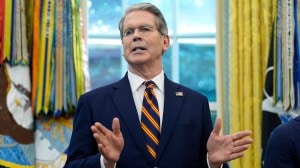A bridge too far
Is there really hope if, despite having the worst infrastructure in the world, we can argue over mythical bridges?

If you viewed as I did last week the hysterics over Ram’s bridge from the perspective of a remote island in the Atlantic that has better airports and roads than India, it is not just disheartening but absurd.
A friend’s wedding brought me to this island. On the evening that the finest politicians in India were creating a frenzy over the existence of a mythical bridge I found myself in conversation with a group of Iranians and Indians who have lived in the United States for decades. An Indian techie in his forties said he was thinking of going home after twenty years in California because India now looked like a country that offered hope.
I agreed patriotically and said that most young Indians these days were coming home after college abroad and this was a sign of hope. The Iranians listened sadly and said they hoped India could become a development model that a country like theirs could follow. And, I, bursting momentarily with patriotic sentiment, said we had the advantage of not having religion mixed up with politics and governance.
So when I came home and read the Indian newspapers online and found that the most serious political issue of the moment was Ram’s mythical bridge, I wondered if I was not being recklessly optimistic about the future of our ancient, impoverished, semi-literate land. Is there really hope if, despite having the worst infrastructure in the world, we can argue over mythical bridges and mythical gods? Is there hope if the Union law minister needs to say, “The government admits its mistakes and wants to remove any doubt whatever that it does not believe in the existence of Ram. The existence of Ram cannot be doubted. As Himalaya is Himalaya, Ganga is Ganga, Ram is Ram. Ram is an integral part of our ethos and cannot be alienated from our hearts.”
Fine. If Christians can believe Jesus was the son of god and Muslims can believe that their Prophet had long conversations with god then why should Hindus not believe that Ram built a bridge to Lanka in a time before recorded history? Faith is faith and there is little anyone can do to persuade the average human that it’s time to start asking some questions.
What worries me is when an India that is on the verge of modernity and an economic boom should be more worried about Ram’s setu than it is about real infrastructure problems. Did nobody notice that the finance minister told a parliamentary committee that India needed to up its investment in infrastructure from the 4.6 per cent it is today to eight per cent in the next five years? Without this the economy cannot grow at nine per cent a year. The finance minister said, “The most visible indicators of overstretched infrastructure are India’s congested highways, airports and ports.”
He then provided the committee with these figures. Infrastructure will need an investment of Rs 1,450,000 crore during the Eleventh Plan. The power sector needs Rs 616,500 crore, railways Rs 300,000 crore, highways Rs 220,000 crore, civil aviation Rs 40,000 crore, and ports Rs 50,000 crore in the next five years. He admitted that the public sector could not pay for all this and private investment will be necessary.
It should worry us that the enormity of our infrastructure problem does not worry our politicians and that they consider a mythical bridge more important. But there is a sad little reason for this and the reason is that despite the dramatic economic changes we have seen as a result of economic reform, we do not have a single political leader who dares explain to ordinary Indians the importance of what has happened. It is not just Marxist politicians who believe in economic reform by stealth; it is all our politicians.
Instead of telling people that without modern roads, airports, ports and power supply India will remain a poor country forever, they bewail poverty as if it were something god gave India as a special gift. They do not explain that the only reason why a country as rich as India is mired in poverty is because of bad economic policies and a shameful absence of real investment in schools, healthcare and sanitation.
When election time comes round and they have failed yet again to deliver on ‘bijli, pani, sadak’ they offer up more grandiose and unworkable ‘poverty alleviation’ schemes, and when that doesn’t work, we go back to that old, destructive formula of temple and mosque, gods and prophets.
As I drive along excellent roads on this beautiful island and notice that there is not a single open drain or heap of rotting garbage I think what India could be like if we ever get our priorities right.
Photos





- 01
- 02
- 03
- 04
- 05


























